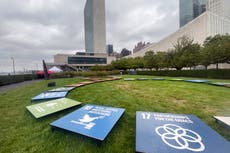Indian diplomats blocked from attending event in Glasgow Sikh temple: ‘Disrupted by extreme elements’
Country says its officials were ‘threatened and abused’ by what it called ‘non-local extremist elements’

India has lodged a complaint to the UK after its top diplomats were barred from attending a planned interaction at a Sikh temple in Glasgow.
The incident comes as diplomatic ties between India and Canada – that has a large Sikh community – plummeted after prime minister Justin Trudeau alleged Indian government agents were involved in the murder of a Sikh separatist leader.
On Friday, visuals showed Vikram Doraiswami, India’s high commissioner to the UK, and another senior official being forced to abandon a community gathering organised at a gurudwara, or Sikh temple, in Glasgow after being confronted by activists.
Mr Doraiswami was seen leaving the premises after being met by three protesters, with one man seen pulling at the door of a car that had the Indian diplomat inside.
India’s embassy to the UK said its diplomats were “threatened and abused” by what it called “non-local extremist elements”.
“One of the non-local extremist elements attempted to violently force open the HC’s [High Commissioner] car door – a matter that will require suitable police consideration. It is due to the quick reaction of one of the organisers, who physically intervened at the car door, that a bigger incident was avoided,” it said in a statement.
The diplomats were “threatened and abused by these elements”, it said and added that the High Commissioner and the Consul General left the premises shortly after arriving “in an effort to prevent any potential altercation”.
A Sikh youth group claimed the envoy’s visit violated a longstanding ban on Indian officials visiting gurdwaras.
The High Commission of India said it reported the “disgraceful incident” to the Foreign Commonwealth & Development Office (FCDO) and the Metropolitan police.
The Independent has reached out to the FCDO and the Met police office for comment.
A spokesperson for Scotland’s police force said officers had been called to a report of a disturbance near the gurdwara, but there were no injuries. Enquiries were ongoing and no arrests had been made, police said.
“Glasgow Gurdwara strongly condemns such disorderly behaviour to disrupt the peaceful proceedings of a Sikh place of worship,” the religious body said in a statement.
A British government minister also expressed her concern over the incident. “The safety and security of foreign diplomats is of utmost importance and our places of worship in the UK must be open to all,” junior foreign office minister Anne-Marie Trevelyan said in a post on X/Twitter.
Outside of India, Canada and Britain house the largest populations of Sikhs. Several members of the community had emigrated to flee violence in the 1970s and 1980s in the Indian state of Punjab that killed thousands.
Calls for a separate homeland for Sikhs, known as Khalistan, to be carved out of India have been a bone of contention between India and Canada. India sees the movement for a separate Khalistan state as a security threat.
The Indian government dismissed Canada’s allegations made earlier this month about the murder of Sikh separatist leader Hardeep Singh Nijjar and called them “absurd”.
Join our commenting forum
Join thought-provoking conversations, follow other Independent readers and see their replies
Comments




Bookmark popover
Removed from bookmarks